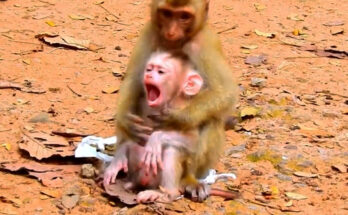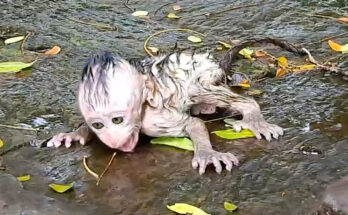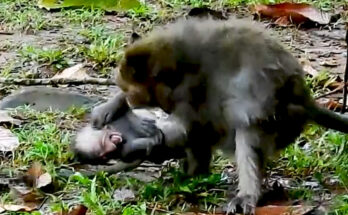
In the quiet corner of the forest, a heartbreaking scene unfolds. A tiny baby monkey, no older than a few weeks, clings desperately to his mother’s fur. His little cries echo softly as he sobs and begs for milk, but his old mom pays him no attention. Her tired eyes stare off into the distance, her body still and unresponsive, as though she’s already given up the nurturing role she once held.
The baby, clearly hungry and confused, nudges her belly repeatedly, hoping for comfort and nourishment. His soft whimpers turn into loud, sorrowful cries, shaking his little body with every sob. Yet, no matter how hard he tries to get her attention—tugging on her, climbing over her back, and crying out—his efforts are met with cold silence.
Perhaps the mother is too weak, too old, or too detached to respond. Whatever the reason, the baby monkey doesn’t understand. All he wants is the warmth of her milk, the comfort of her touch, and the love that should naturally flow between a mother and her child. But instead, he faces rejection.
Other monkeys in the troop seem to notice his distress, some watching curiously, others ignoring the scene altogether. The little one’s hope slowly fades as he curls up at her feet, still sniffling, still pleading with tiny, tear-filled eyes.
It’s a painful moment to witness—a raw display of helplessness and abandonment. The baby monkey’s sobs are not just for milk, but for the love and connection he so desperately needs but cannot find. As nature takes its course, this tiny soul is left to learn a harsh lesson far too early in life: sometimes, even a mother’s love may fade.


